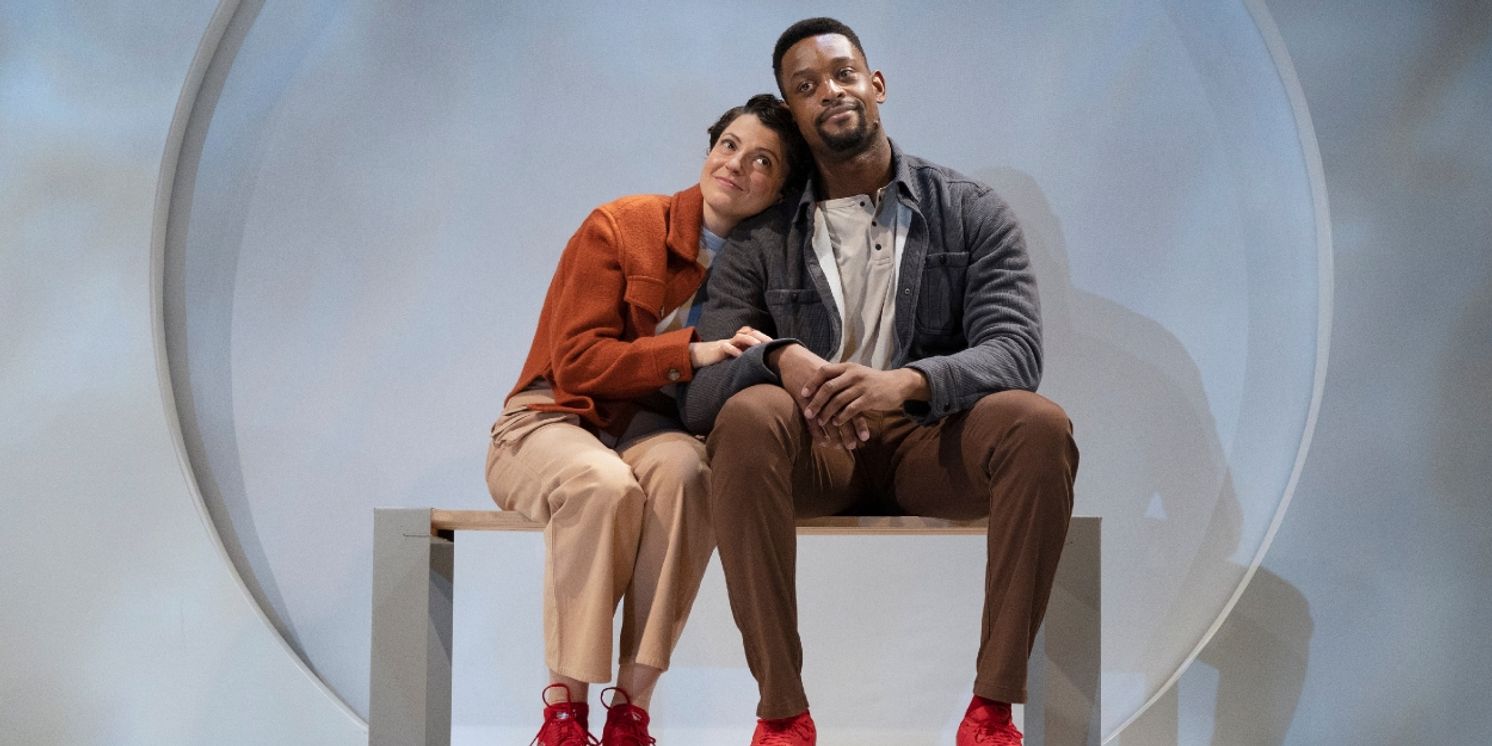Review: REDBONE COONHOUND at Tarragon Theatre
Sizzling satire is a topical discussion of intersectionality and oppression

Sometimes, a dog breed is just a dog breed...or is it?
That's the hotly debated question in Amy Lee Lavoie and Omari Newton's new play at Tarragon Theatre, co-produced with Montreal's Imago Theatre. In REDBONE COONHOUND, interracial couple Mike and Marissa (Christopher Allen and Chala Hunter) find the delicate power balance that comes from living in the world with vastly different experiences can be upset by a small incident that carries the weight of history.
A real moment in Lavoie and Newton's relationship provides the inciting incident. On a walk in Vancouver, as Mike bemoans the woefully-uneducated schoolchildren he encounters as a traveling educator during Black History Month, the pair encounter a boisterous dog, barely restrained by its jogging owners. As the dog tracks Mike around the park, the older white couple (Brian Dooley and Deborah Drakeford), boasting of the international puppy acquisition, drop the breed's name. Mike is sickened by the anti-Black slurs contained within, while Marissa doesn't see the problem, urging him to prioritize intent over effect in his reaction.
What follows is a biting, funny, and complex exploration of intersectional axes of oppression, as the couple's hosted gathering with college friends Aisha (Lucinda Davis) and Jordan (Jesse Dwyre), a Black woman and a white man, and Aisha's boyfriend Gerald (Kwesi Ameyaw), a Black police officer, explodes in a debate about the power of words versus actions, cultural appropriation versus cultural celebration, and whether we are excused from caring about others' oppression if we are experiencing our own (possibly worse) oppression. Full of up-to-the-moment references, it feels like being dumped into online discourse run amok. Here, though, the participants are right here in our faces; present, real, and hurting.
While the argument rages, it's interspersed with a series of exaggerated, vaguely surreal sketches, which present a twisted look at history that satirizes the issues in the dining room. Targets range from well-meaning "allies" and cultural infighters to the proudly uneducated and uncaring. Director Micheline Chevrier, with Kwaku Okyere, transports us with verve from the days of the Underground Railroad - which isn't a real railroad...but what if it were? - to an Afrofuturist vision where a spaceship runs on white tears.
Meanwhile, the dog, not actually present on stage, runs via projection through the otherwise completely white, geometric landscape (set design by Jawon Kang) during scene breaks. Loaded words and images from the show appear and dissolve, dreamlike around it. The projections, designed by Frank Donato with animation by Dezmond Arkvarn, meld seamlessly with a trippy soundscape by Thomas Ryder Payne. Propelling us forward, they remind us of the both impactful and transient nature of language.
The party scenes follow more of a traditional theatrical conceit and therefore are not as structurally exciting as the sketches, but are where the true electricity crackles. While the sketches have a clearer, more direct point and narrative, Lavoie and Newton's breezy, self-aware dialogue in the naturalistic sections is more complex, skewering each character in turn, sometimes simultaneously. One person makes a point you may find yourself agreeing with (certainly, the audience was even exclaiming audibly at moments), then, in the next sentence, will declare something breathtakingly myopic, yet consistent with the previous statement. The cast also finds a rhythm and ease here that's not as present in some of the earlier scenes. We're swept along with the discussion, while also feeling acutely aware of the fallout of prioritizing words and ideals over the real, necessarily imperfect people with whom we share our lives.
That's not to ignore the wild and anarchic sketches, which are a stitch. The cast fully commits to their broad, stagey aspect, from Davis' rapping Harriet Tubman and Dooley's clueless, self-important Quaker, to Drakeford's weaponized Karen snarling like a tiger next to Davis and Ameyaw's militaristically stiff Comrade Black and Comrade Blackity Black.
One sketch, featuring Hunter as an adorable Shirley Temple-esque child entertainer and Ameyaw gleefully subverting tropes to teach her about the pain behind his ability to sing and dance, gets delightfully dark and twisted very quickly. It's in these unexpected bursts of pain that the satire really hits the mark, like when Allen's character, an escaped slave crossing the northern border, hopefully declares, "Canada's going to love me!"
At the same time, the clever conceits sometimes outstay their welcome; for example, a sketch where a young woman's white parents are disappointed that they won't get to further display their unsettling, overblown love from all things African through their future son-in-law has some killer moments, but telegraphs its inevitable punchline minutes in advance. I was impatient to get back to Mike and Marissa, thinking there might be a tighter 90-minute show in the high-energy 100-minute performance. This time could also be spent further developing the moving, contemplative simplicity of the ending, which could use more room to breathe and grow.
REDBONE COONHOUND is unabashedly an "idea play," which is part of its charm. Instead of attempting to cloak the issues in plot and exposition, it brings them to the forefront. Outside, before the show, I overheard the excited comment, "This is going to be taught in schools!" With its entertainment value, topical subject matter, and thoughtful writing, I wouldn't be surprised.
Photo of Chala Hunter and Christopher Allen by Cylla von Tiedemann
Reader Reviews

Videos

